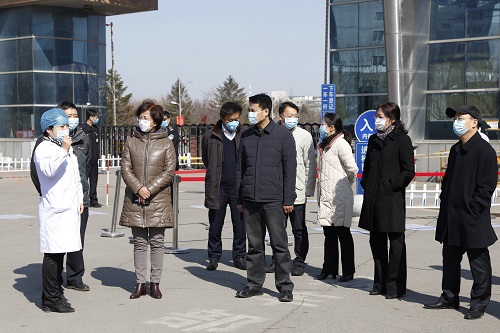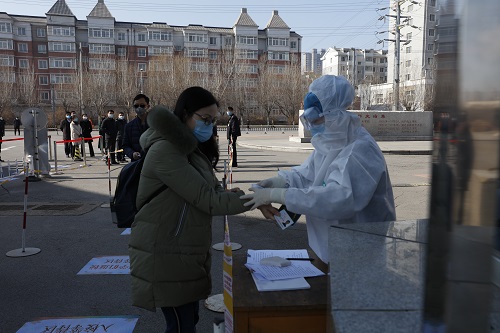In order to implement the work arrangement of the Provincial Party Committee, the Provincial Government and the Provincial Epidemic Prevention and Control Office, effectively carry out the epidemic prevention and control work after the starting of the university, improve the contingency plan process, and master the emergency measures after the starting of the university, Shenyang University of Chemical Technology organized and carried out the emergency practical drill for the epidemic prevention and control work on March 17. Member of the Party group, Deputy Director of the Provincial Education Department Hua Lei together with a group of two visited the university for on-site inspection and guidance. Members of the leading group of epidemic prevention and control work of our university, and personnel of all relevant departments and colleges participated in the emergency drill.


The emergency drill for epidemic prevention and control officially began at 10 a.m. According to the disposal method for coronavirus pneumonia epidemic and emergency drill program put forward by our university, the drill mainly simulated the students' registration, student dormitory disinfecting, running fever, staggering students' dining time, campus public health condition guarantee, teaching and other public affairs and psychological problems. The whole drilling process shall be carried out in strict accordance with the procedures specified in the plan, and all personnel shall be prepared for work, with clear division of labor and close cooperation.
Deputy Director Hua Lei and her party inspected the practice on spot. She specifically inquired the details about the process of the students' returning to school, the storage of epidemic prevention materials and disinfection supplies, the arrangement of staggering students' dining time, the organization and operation of online teaching, technical support and the effect of students' feedback. Hua affirmed all the preparations the university did for students’ return. She pointed out that the university should further strengthen organizational leadership, continue attaching great importance to ideology, continue revising and improving the program, continue coordinating in action, do a good job in overall coordination so as to ensure the effectiveness of prevention and control work.
After the drill, school leaders and relevant personnel held a discussion meeting on spot to summarize and exchange the problems and deficiencies found in the drill. For the next step of epidemic prevention and control, Secretary Wang Qiang proposed the "24-word Work Principle": drill is actual combat; summarize work experience; strictly implement the process; resolutely and strictly implement prevention and control methods. Wang put forward three requirements at the same time: first, the word "strict" should prevail. Since the outbreak of the epidemic, the whole university has been on high alert and strictly guarded for the safety and stability of the campus. We should continue taking epidemic prevention and control as a major political task, and strictly prevent, control and do a good job in all aspects of epidemic prevention and control; second, “elaborated” the process. We should summarize the deficiencies in the drill in time, and continue to improve and refine the emergency response plan for epidemic prevention and control on campus; the third is to start from the "solid" point. We should start from every work link, solidly implement the preparation work for epidemic prevention before, during and after the students' return to school, to make full preparation for the students' formal return to school and the restoration of normal teaching order after the finish of epidemic.
The drill tested the emergency command and comprehensive coordination ability of our school. The emergency response process for emergencies was standardized, the emergency response level for epidemic prevention and control was improved, which laid a solid foundation for the smooth start of school and the safety of teachers and students, and accumulated experience for the future emergency response.